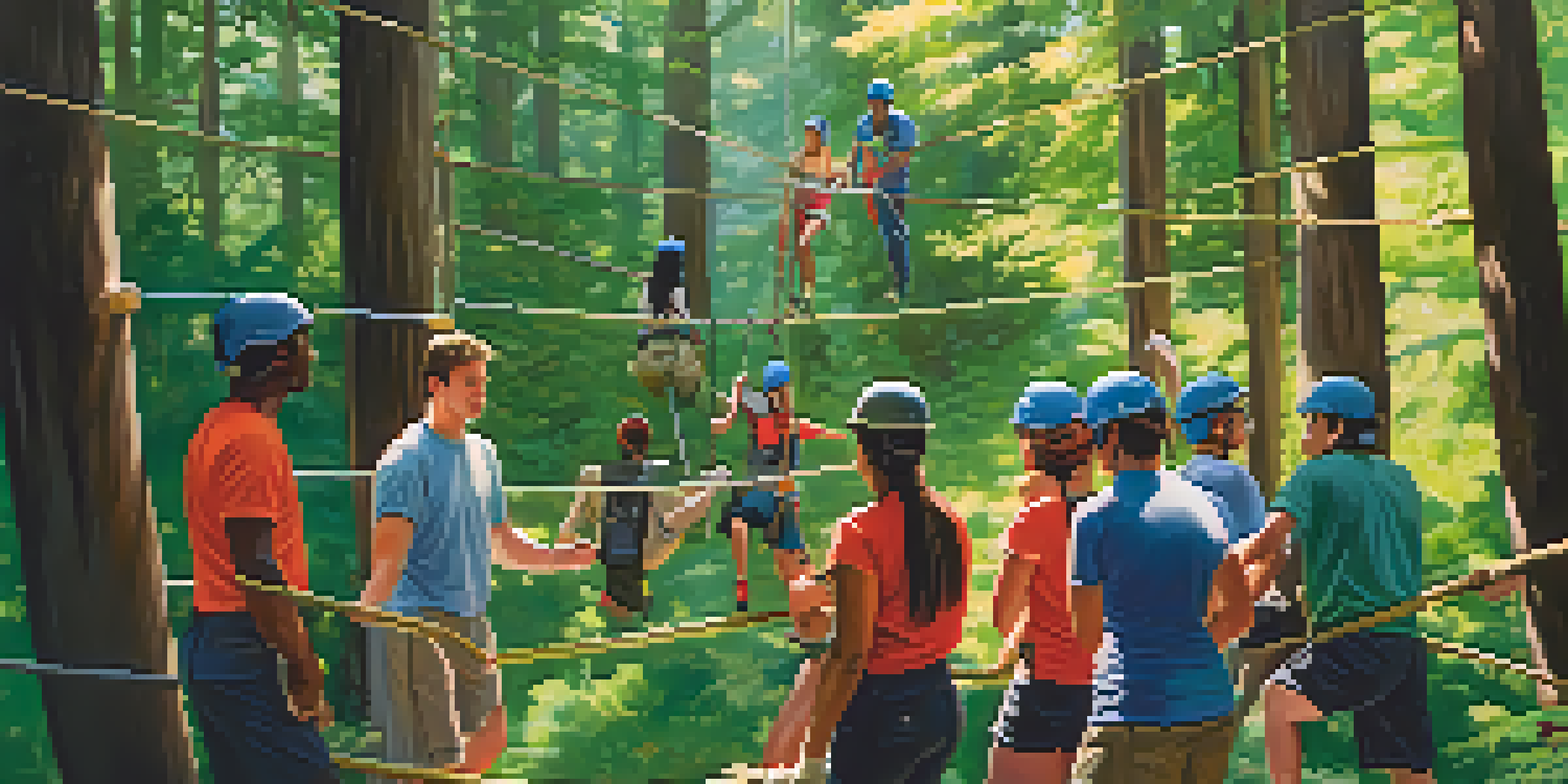Developing Leadership Skills Through Outdoor Education Programs

Understanding Leadership Skills in Outdoor Education
Leadership skills are crucial in today’s fast-paced world, and outdoor education provides a unique platform to develop them. Programs often involve team activities that require communication, decision-making, and problem-solving, all essential traits of a good leader. Through these experiences, participants learn to navigate challenges, fostering both individual growth and teamwork.
Leadership is not about being in charge. It is about taking care of those in your charge.
Moreover, outdoor settings push individuals out of their comfort zones, encouraging them to take initiative and lead in unfamiliar circumstances. Imagine climbing a rock face or navigating a canoe; these activities not only build physical skills but also enhance mental resilience. This blend of physical and emotional challenges is what makes outdoor education particularly effective for leadership development.
Finally, outdoor education emphasizes the importance of adaptability and flexibility—qualities that are vital in any leadership role. As participants face unpredictable weather or changing group dynamics, they learn to adjust their plans and strategies on the fly, mirroring real-life leadership scenarios.
Building Teamwork Through Group Challenges
One of the cornerstones of effective leadership is the ability to work well in a team. Outdoor education programs often incorporate group challenges that require collaboration, trust, and mutual support. Whether it’s a ropes course or a group hike, participants must rely on each other to succeed, fostering a deep sense of camaraderie.

These activities teach individuals how to communicate effectively, delegate tasks, and resolve conflicts—skills that are transferable to any team setting. For instance, when a group is faced with a challenging obstacle, they must discuss their options, weighing each member's strengths and weaknesses. This process not only strengthens bonds but also enhances each participant’s leadership capabilities.
Leadership Skills Through Challenges
Outdoor education fosters essential leadership skills by pushing participants to navigate challenges and make decisions in real-time.
Ultimately, the experiences shared during these challenges create lasting memories and lessons. Participants leave with a better understanding of their role within a team, as well as a greater appreciation for diverse perspectives, which is essential in any leadership journey.
Encouraging Self-Reflection and Personal Growth
Outdoor education provides ample opportunities for self-reflection, a key component of effective leadership. After completing a challenging activity, participants often take time to reflect on their experiences, considering what went well and what could be improved. This practice helps them understand their strengths and areas for growth, fostering a mindset of continuous improvement.
The greatest danger in times of turbulence is not the turbulence; it is to act with yesterday's logic.
Guided discussions and journaling are common practices in these programs, allowing participants to articulate their thoughts and feelings. For example, after a long hike, participants might discuss the mental barriers they faced and how they overcame them. This process not only builds self-awareness but also encourages accountability—both important traits for a leader.
As individuals become more in tune with their emotions and reactions, they can better empathize with others. This emotional intelligence, developed through self-reflection in outdoor settings, is a fundamental aspect of effective leadership, enabling individuals to connect with and inspire those they lead.
Fostering Decision-Making Skills in Real-Time Situations
Outdoor education is rich with opportunities for decision-making, often requiring participants to think on their feet. Whether it's determining the best route to take during a hike or deciding how to respond to an unexpected challenge, these real-time situations mimic the pressures faced in leadership roles. Learning to make quick, informed decisions is crucial for effective leadership.
Participants often find themselves in scenarios where they must assess risks and benefits rapidly. For instance, if a storm approaches during a camping trip, leaders must quickly evaluate safety protocols and communicate effectively with their group. Such experiences teach individuals how to remain calm and focused under pressure, a vital skill for any leader.
Teamwork Builds Strong Leaders
Group challenges in outdoor settings enhance teamwork, communication, and conflict resolution skills, which are vital for effective leadership.
By facing these decision-making challenges, participants build confidence in their ability to lead. Over time, they learn that making mistakes is part of the process, and each decision—right or wrong—contributes to their development as leaders.
Developing Communication Skills Through Outdoor Activities
Effective communication is at the heart of good leadership, and outdoor education provides a unique environment to hone these skills. Participants engage in activities that require clear instructions, active listening, and feedback, all of which are essential for successful teamwork. For example, during a group navigation exercise, one person must articulate the plan while others listen and contribute.
The diverse outdoor settings also encourage non-verbal communication, such as body language and gestures, which can be just as important as spoken words. Participants learn to gauge the mood of their teammates, adjusting their communication style accordingly. This adaptability enhances their ability to connect with different personalities and foster a positive group dynamic.
Ultimately, the communication skills developed in outdoor education can elevate a participant's leadership style. As they become more aware of how they communicate, they can inspire and motivate others, driving the group toward common goals.
Emphasizing Resilience Through Challenging Experiences
Resilience is a key trait of effective leaders, and outdoor education programs are designed to cultivate this quality through challenging experiences. Participants often face obstacles that test their limits, such as extreme weather conditions or physical challenges like hiking steep trails. Overcoming these hurdles teaches individuals the importance of perseverance and grit.
When participants encounter setbacks, such as a navigational error or a sudden downpour, they are given the chance to adapt their plans and push through. This process not only builds mental strength but also encourages a growth mindset—viewing challenges as opportunities for learning rather than insurmountable problems. Leaders who can bounce back from adversity inspire confidence in their teams.
Self-Reflection Fuels Growth
Opportunities for self-reflection in outdoor education help participants develop emotional intelligence and accountability, key traits of successful leaders.
Moreover, the supportive environment of outdoor programs fosters a sense of community, where participants encourage each other to keep going. This shared resilience not only strengthens individual character but also creates a culture of support that is vital for effective leadership.
Creating Lasting Connections and Networks
Outdoor education programs often bring together individuals from diverse backgrounds, creating opportunities for meaningful connections. These shared experiences—whether it's camping under the stars or tackling a challenging hike—forge bonds that can last a lifetime. Networking in such an environment is not just about building professional connections; it’s about forming genuine friendships.
The relationships developed in outdoor settings can be incredibly enriching. Participants often find mentors among their peers, learning from each other’s experiences and insights. This mutual support system can be a valuable resource as they navigate their personal and professional lives, helping them grow as leaders.

Ultimately, the connections made through outdoor education extend beyond the program itself. These networks can lead to collaborative opportunities, shared projects, and even lifelong friendships, all of which enrich the leadership journey.